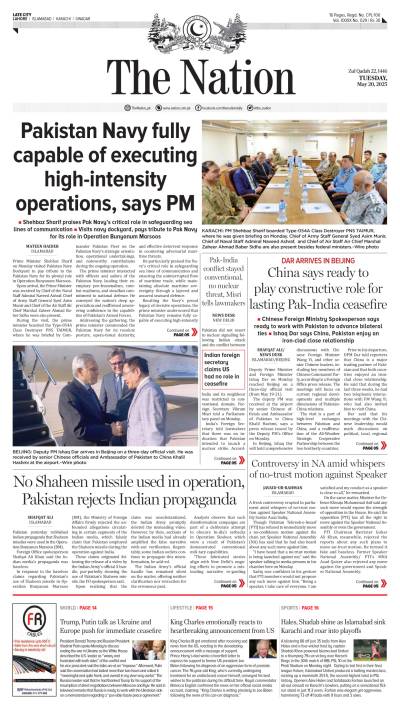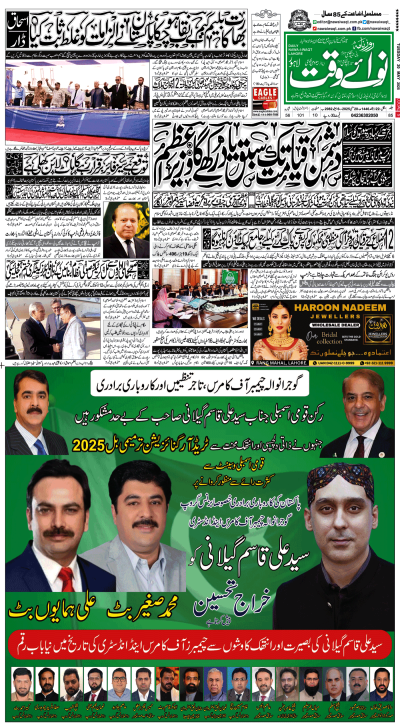Mr Barack Obama has been chosen by his nation to preside over world's most powerful office in order to bring about change, a change not imposed from without but campaigned by Obama himself. Interestingly the dimensions of the change were never defined either by Obama or his supporters. Asked once in his long drawn out campaign to define change, Obama pointing to the crowd around him replied, "We are the change." In the absence of a universally accepted definition, everyone went around giving one, which suited his or her views. For instance, the US public understands by the word change racial equality, end of Republican rule and withdrawal of US troops from Iraq. Other implications of the slogan were buried under these three statements. Many thought change would mean radical transformation of the American socio-economic system, a Roosevelt-style reform. A new, New Deal, which would herald the dawn of a new era in domestic and world affairs. However, an overwhelming number interpreted the change in the context of war and peace and they were perhaps correct. They viewed Obama as a man of peace who would bring their youngsters home from the killing fields of Iraq as soon as possible. This segment of the American society saw no sense, first in starting the Iraq war and then continuing it without any clear-cut objectives. The Republicans' attempt to shift the focus from Al-Qaeda in Mesopotamia to Al-Qaeda-Taliban Axis to Pak-Afghan border made some but not much sense to the American voters. The slogan of "compassionate conservatism" had since long lost its validity. Thus the first thing Americans expect from Obama is to call off the war in Iraq and withdraw US troops from that unfortunate country. As far as the insurgency in the Pak-Afghan sector is concerned, they are not fully aware of the political background of Taliban and their goals in Afghanistan. Regrettably, US drones are launching almost daily air attacks on the alleged Al-Qaeda men and causing an average of twenty causalities of civilians per day. Obama certainly differs with Bush on strategy towards Pakistan. Bush believed in "eliminating" each and every Al-Qaeda and Taliban men; Obama talks of carrots and sticks. Fight the insurgency but keep open the doors for talks, a diplomatic engagement. Pakistan welcomes this policy and is ready to lend a helping hand. According to generals Casey and Abizaid, both veteran of Iraq war, and quoted in Bob Woodward's book The War Within, say that they failed to sell to Bush the path of dialogue combined with anti-insurgency operation. "The Commander in Chief", Casey said, believed in an attrition strategy for the bad guys. The US had killed tens of thousands of Iraqis. The classified operational summaries showed that 1000 Iraqis defined as Al-Qaeda insurgents, or other violent extremists were being killed each month. The Iraqi and Vietnamese experiences show that the policy of eliminating insurgency through killing does not succeed. There would always be a fresh pack of insurgents around to replace their dead comrades. The indiscriminate killing also spreads a wave of hatred against those who wish to conquer. Besides, the possibility of winning hearts and minds, which was expectation of Bush when his troops entered Baghdad, is invariably lost. As he goes through transition selecting White House staff and his Cabinet, Obama would be going through policy review. Usually the actors are chosen according to requirement of the script. At this juncture the script requires performers who could work out peace in Iraq and peace in Afghanistan. The war in the traditional sense cannot be won through military might; accepting rights of the people could bring about peace. Obama must realise that not just his own people but the whole world waits for him to deliver peace. Much will depend on the actors he picks up for the required role. Bush has done Pakistan unlimited damage. Three times did he pronounce from the White House lawns last summer that "Pakistan is the most dangerous state in the world." In the same breadth he described Pakistan as the US "closest ally" in the war against terror. Mr Obama's team should know that such statements and bombing of Pakistani territory by US drones have largely destroyed the goodwill between the two countries. Deterioration in relations has occurred to such an extent that people of Pakistan are beginning to consider Bush and his country as enemies rather than friends. Basically, there are two reasons for the alienation. One, a perception has been built up that US regards Muslims as their enemy. Two, US air attacks in Pakistani territory is often directed against innocent citizens. The US is just too far for the insurgents to go after. Their propaganda line says that they attack Pakistani targets because its government is helping the Americans. Ironically Pakistan receives beating from both, Americans as well as militants. Obama like NATO military experts will soon realise that war against Afghan and Pak tribesmen is unwinnable and divert the American resources towards peace through dialogue. In any case he just cannot ignore the reaction to drone attacks in Pakistan. Talking about the subject soon after the Strategic Dialogue in Washington in the second week of November, Pakistan's National Security Advisor M A Durrani said, "Attacks by predators are very distracting for us and at some stage Obama as president might have to step in to decide whether there Predator strikes should continue." They have become spoilers, rather than helpers. Considering his outlook of life, his politics and his personality traits as reflected in his speeches, Obama cannot ignore the preceding factors causing trouble to large part of the world. During his election campaign he strived to project himself as a man of peace and not of war. It is logical therefore to expect him to play the role of peacemaker. Choosing the path of war will not only amount to betraying his voters but also deny him the record term. The writer is a freelance columnist
Wednesday, May 21, 2025
Will Obama choose war or peace?
DPM Dar, Chinese FM hails all-weather strategic cooperative partnership
8:43 PM | May 20, 2025
FIA cracks down on Gujranwala passport scam, nabs 14 agents
4:44 PM | May 20, 2025
Govt reviews monsoon preparedness amid rising flood risks
4:36 PM | May 20, 2025
Ahsan Iqbal,CM Bugti discuss development projects
4:33 PM | May 20, 2025
-
Lahore emerges among safest global cities in Numbeo 2025 index
-
Lahore emerges among safest global cities in Numbeo 2025 index
-
India’s suspension of Indus Water Treaty legally baseless
-
Seventh polio case reported in Pakistan amid nationwide vaccination drive
-
Pakistan reports sixth polio case of 2025
-
PTA begins issuing VPN licences to regulate usage
The Wider War
May 20, 2025
Margalla on Fire
May 20, 2025
Defeated and Depressed
May 20, 2025
Regional Reset
May 19, 2025
Peak Potential
May 19, 2025
Worse than Anarchy
May 20, 2025
Salute to our Air Force
May 20, 2025
An Unbreakable Wall
May 20, 2025
Profiteering Milk
May 20, 2025
Rewriting the Rules
May 20, 2025
ePaper - Nawaiwaqt
Nawaiwaqt Group | Copyright © 2025





